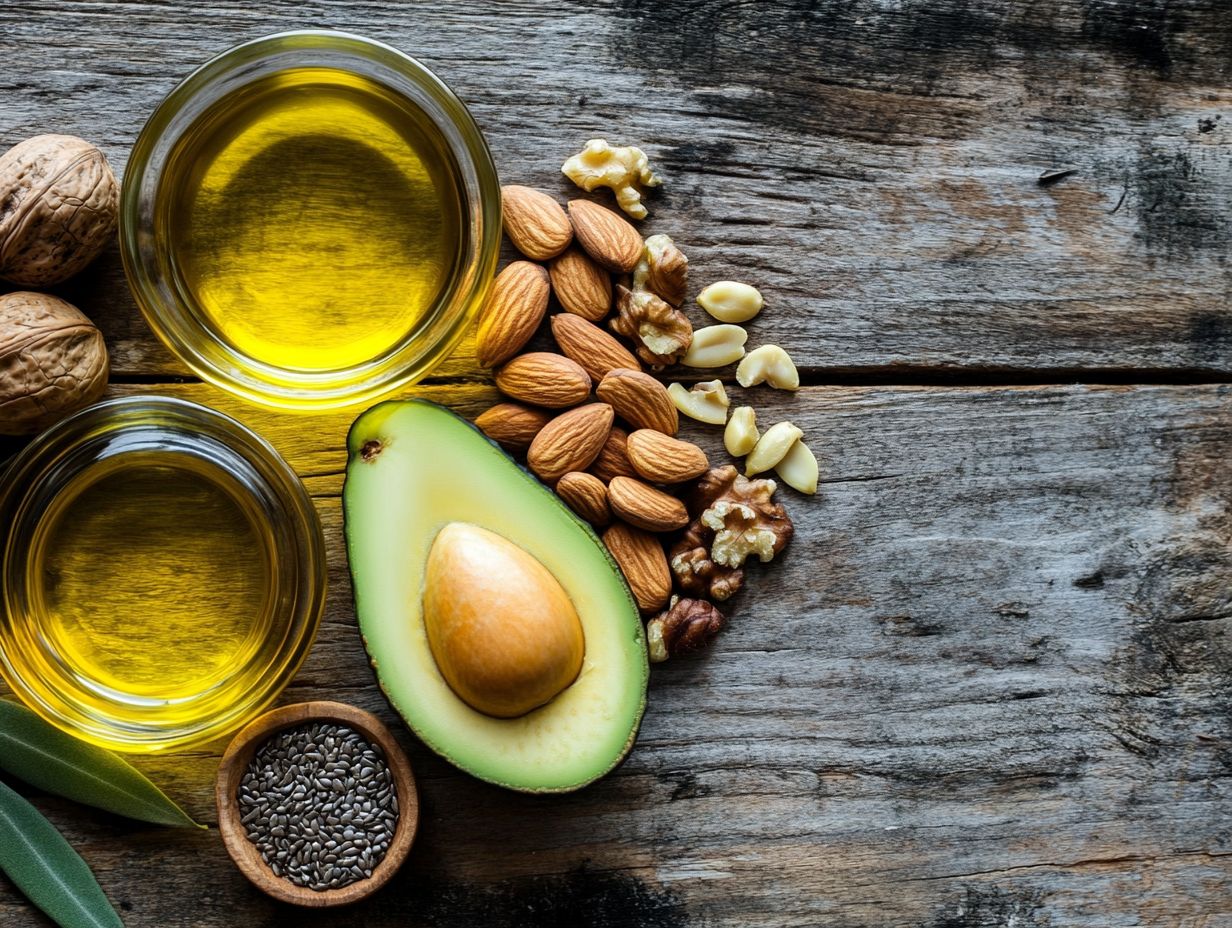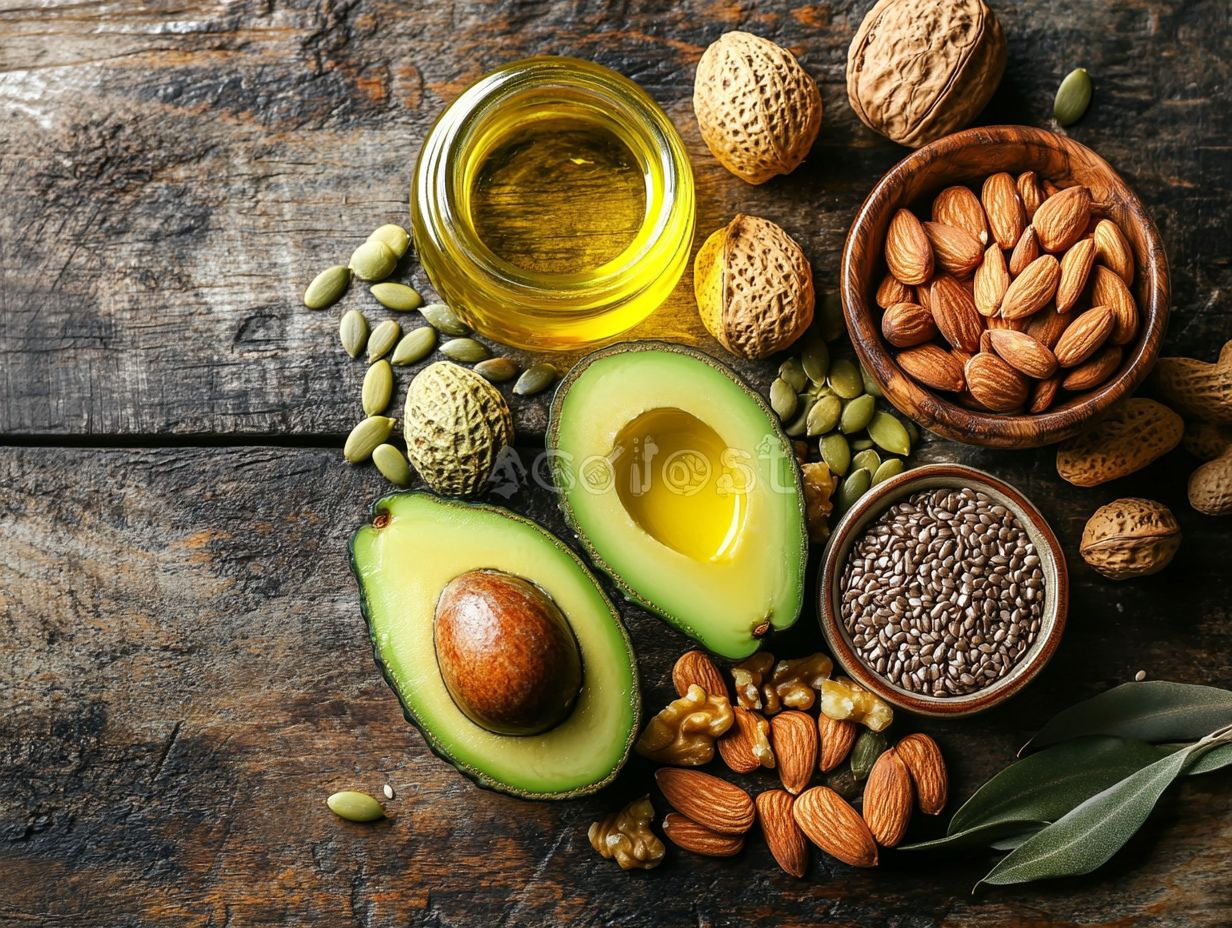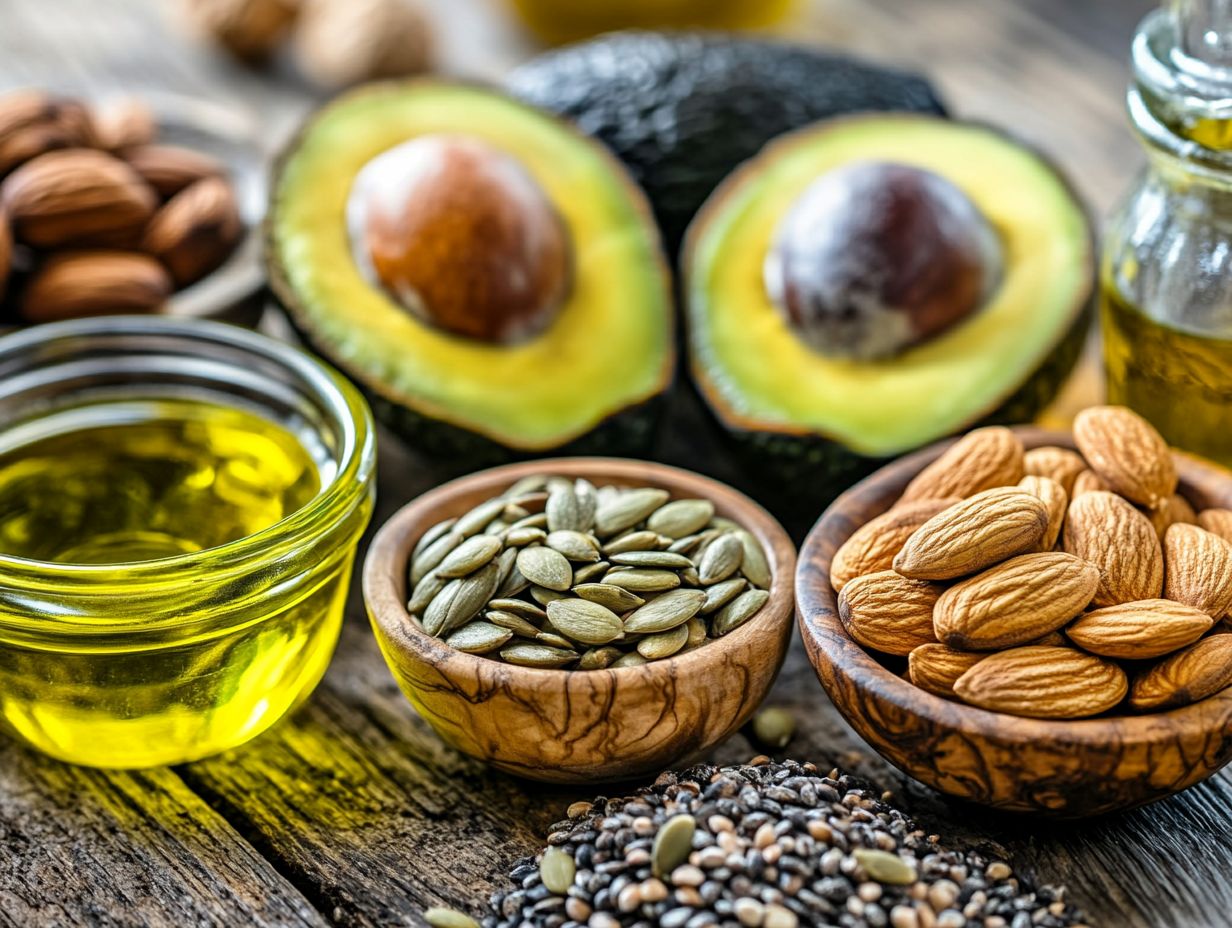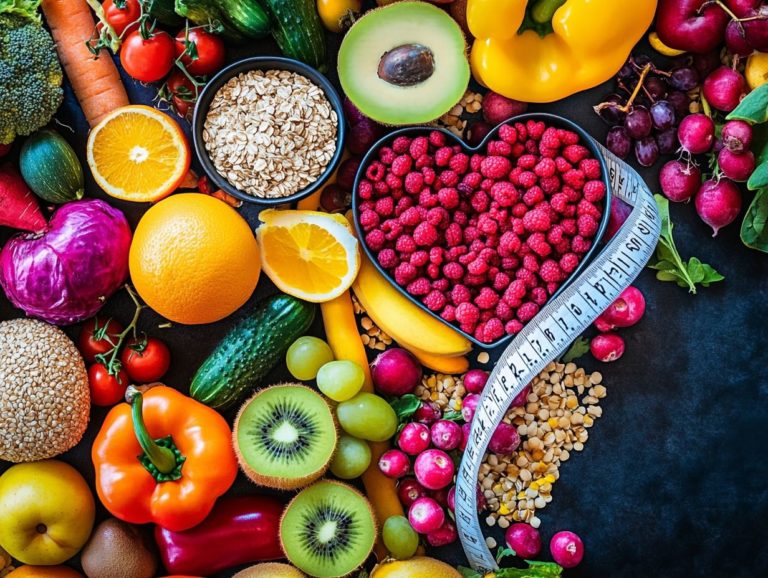The Role of Healthy Fats in Your Diet
Healthy fats are frequently misjudged. Yet, they hold a vital place in enhancing your overall well-being.
This article delves into the various types of healthy fats, emphasizing their significance and the many benefits they offer for your health. From plant-based to animal-based sources, you ll uncover effective ways to seamlessly integrate these essential fats into your meals.
This article tackles common myths about healthy fats, empowering you to make informed dietary choices that foster a balanced lifestyle. Immerse yourself in this exploration and enrich your understanding!
Contents
Key Takeaways:

Healthy fats are essential for overall health and should not be avoided in your diet.
Plant-based sources such as avocados and nuts are great options for incorporating healthy fats into meals.
Common misconceptions about fats, such as all fats being unhealthy, should be dispelled to understand the role of protein in healthy eating and the importance of healthy fats in a balanced diet.
Understanding Healthy Fats
Understanding healthy fats is essential for maintaining a balanced diet and promoting overall well-being. Dietary fats fall into two primary categories: saturated and unsaturated fats.
Each type influences cholesterol levels and heart disease risk differently. By incorporating healthy fats such as omega-3 fatty acids, monounsaturated, and polyunsaturated fats into your meals, you unlock numerous health benefits.
These fats enhance fat absorption and support the intake of essential vitamins A, D, E, and K, which dissolve in fats and are crucial for health.
Types of Healthy Fats
Healthy fats fall into two main categories: saturated and unsaturated fats. Each plays a unique role in your health. You’ll find saturated fats in foods like coconut oil and palm oil.
Unsaturated fats, including both monounsaturated and polyunsaturated varieties, are abundant in olive oil, avocados, nuts, and omega-3-rich fatty fish.
These distinctions carry significant health implications. Unsaturated fats, especially the monounsaturated kind found in olive oil, can lower bad cholesterol levels and reduce your risk of heart disease.
On the flip side, saturated fats common in red meat and full-fat dairy can raise cholesterol levels when consumed excessively, potentially putting your cardiovascular health at risk.
Don t overlook trans fats, often lurking in processed foods and baked goods. These are harmful and linked to increased inflammation and heart issues.
Essential fatty acids, like omega-3 and omega-6, are crucial for brain health and inflammation reduction. You can get your omega-3s from fatty fish like salmon and flaxseeds, which protect your heart.
Omega-6s, found in vegetable oils like sunflower and corn oil, are also essential. However, it’s wise to balance your intake with omega-3s to avoid negative effects.
The Importance of Healthy Fats in Your Diet
Healthy fats hold a critical place in your diet. They significantly impact cholesterol levels, support heart health, and provide a concentrated source of energy.
These fats are essential for absorbing fat-soluble vitamins. By selecting the right fats, you can reduce heart disease risk while enjoying calorie-dense ingredients that elevate both flavor and nutrition in your meals.
Benefits for Overall Health
Incorporating healthy fats into your diet offers a wealth of benefits that go beyond just enhancing flavor. They play a significant role in your overall health and well-being.
Take omega-3 fatty acids, for example they are celebrated for their anti-inflammatory properties. They remarkably improve heart health by regulating cholesterol levels and lowering heart disease risk.
Healthy fats, like those in avocados and nuts, are essential for cognitive function. Research shows that diets rich in monounsaturated fats can boost memory and learning capabilities.
These fats may also reduce the risk of neurodegenerative diseases such as Alzheimer s. Incorporating healthy fats into your meals promotes feelings of fullness and satisfaction, helping you resist the temptation to overeat.
Experts recommend prioritizing sources of healthy fats. They not only nourish your body but also support your overall wellness, leading to improved mood and heightened energy levels throughout the day.
Start incorporating healthy fats into your meals today for a healthier lifestyle!
Sources of Healthy Fats

Incorporating healthy fats into your diet can be an enjoyable endeavor, bringing flavor and nourishment to your meals. You have a wealth of delicious options at your fingertips.
- Think of fatty fish like salmon, brimming with omega-3 fatty acids.
- Or plant-based delights such as olive oil, avocados, and an array of nuts.
These options not only tantalize your taste buds but also provide essential healthy fats that benefit your health. Embrace these choices, and savor every bite while enhancing your well-being.
Plant-based Sources
Plant-based sources of healthy fats are nutritious, versatile, and bursting with flavor. Take olive oil, for instance it’s celebrated for its heart-healthy benefits.
Avocados offer a delightful creamy texture along with a wealth of nutrients like fiber and potassium. Nuts and seeds like walnuts and chia seeds are also great sources of omega-3 fatty acids.
These support brain health and help reduce inflammation. Tossing a handful of walnuts into your salad or adding chia seeds to your smoothies can elevate both the taste and the nutritional value of your meals.
Coconut oil is another gem in the kitchen, packed with medium-chain triglycerides. It s perfect for cooking thanks to its high smoke point and imparts a subtle sweetness to baked goods.
Dive into these ingredients today, and discover a world of culinary delight that boosts your health!
Animal-based Sources
Animal-based sources of healthy fats, especially fatty fish, are your go-to options for boosting omega-3 intake. Fish like salmon and mackerel serve up essential fatty acids that support heart health.
These fatty fish are abundant in vitamins D and B12, along with minerals such as selenium. Incorporating these into your meals can be refreshingly simple grill a salmon fillet for dinner or toss some canned sardines into your salad for an easy upgrade.
Don t overlook other animal-based sources like grass-fed beef and free-range eggs, which also offer healthy fats. Choose sustainably sourced products to support your health and nurture the environment.
This helps foster a balanced ecosystem for future generations.
Incorporating Healthy Fats into Your Diet
Incorporating healthy fats into your daily diet is achievable with thoughtful choices and straightforward adjustments to your meal preparation. Dietary guidelines often suggest that fats should make up a portion of your daily caloric intake.
By understanding the recommended daily intake, you can make informed decisions about how much healthy fat to include. This ensures your meals contribute positively to your overall well-being.
Recommended Daily Intake
The recommended daily intake of healthy fats can vary according to dietary guidelines, but a solid rule of thumb is to aim for fats to make up about 20-35% of your total daily calories. This ensures you re getting enough essential fatty acids while keeping your diet balanced.
Health organizations like the American Heart Association and the World Health Organization emphasize that not all fats are created equal. They suggest prioritizing unsaturated fats found in foods like avocados, nuts, and olive oil while minimizing saturated and trans fats in processed foods.
One easy way to stick to these recommendations is to add a handful of mixed nuts to your daily snack lineup. Drizzle some olive oil over your salads instead of heavy dressings.
By making these mindful choices, you not only meet your fat intake goals but also support your heart health.
Start adding healthy fats to your meals today and feel the difference in your energy and mood!
Ways to Add Healthy Fats to Meals

Transform your meals today! You have many ways to incorporate healthy fats into your meals without sacrificing taste or nutrition. Picture this: adding creamy avocados to your salads. Drizzling high-quality olive oil over your dishes. Snacking on a handful of nuts. These are just a few effortless ways to seamlessly integrate healthy fats into your everyday cuisine.
By exploring various sources of healthy fats think fatty fish, seeds, and nut butters you can craft diverse and satisfying meals for any occasion.
- For breakfast, consider stirring chia seeds into your smoothies or topping whole-grain toast with almond butter and banana for a delightful twist.
- At lunch, indulge in a Mediterranean bowl brimming with quinoa, olives, and a generous drizzle of tahini.
- For dinner, how about grilling salmon alongside roasted Brussels sprouts tossed in olive oil to elevate your plate?
- Even your snacks can benefit from a handful of walnuts or a decadent slice of dark chocolate.
Get creative! Use these healthy fats to boost both flavor and nutrition.
Myths and Misconceptions about Healthy Fats
Numerous myths and misconceptions regarding dietary fats can create confusion and foster unhealthy eating habits.
One prevalent belief that all fats are detrimental is misleading. While saturated fats can pose health risks when consumed excessively, healthy dietary fats are vital for a balanced diet.
They can even support weight management and promote heart health, highlighting the importance of embracing the right types of fats in your nutrition.
Dispelling Common Misbeliefs
Dispelling common misconceptions about dietary fats is essential for developing a clearer understanding of their role in a nutritious diet. One widespread myth is that all dietary fats lead to weight gain, overlooking the crucial distinction between beneficial fats like those found in nuts and fatty fish and detrimental fats typically found in processed foods.
This misunderstanding might cause you to cut out essential fatty acids from your diet, which are vital for numerous bodily functions, including hormone production and nutrient absorption. In truth, healthy fats are valuable allies in maintaining a balanced diet, as they support heart health and can even assist in weight management by promoting a sense of fullness.
Take, for example, monounsaturated and polyunsaturated fats found in avocados and olive oil. These fats nourish your body while reducing the risk of chronic diseases. Recognizing the difference between these fats is imperative for making informed dietary choices that enhance your overall well-being.
Frequently Asked Questions
What are healthy fats?
Healthy fats are a type of dietary fat that is essential for the body and provides various health benefits. They are unsaturated fats, the good fats that can improve heart health, found in plant-based foods and certain types of fish.
How do healthy fats benefit the body?
Healthy fats are important for maintaining good health and play a crucial role in various bodily functions. They help maintain healthy skin, hair, and nails, support hormone production, and aid in the absorption of vitamins and minerals. They also provide energy and help regulate inflammation in the body.
What are some examples of healthy fats?
Some examples of healthy fats include avocados, nuts and seeds, olive oil, fatty fish such as salmon and tuna, and coconut oil. These foods are high in monounsaturated and polyunsaturated fats, which are considered healthy fats.
Can healthy fats help with weight loss?
Yes, healthy fats can aid in weight loss when consumed as part of a balanced diet. Healthy fats provide a feeling of satiety and can prevent overeating. They also help regulate blood sugar levels, which can aid in weight management. However, it’s important to consume healthy fats in moderation, as they are high in calories.
Start adding these healthy fats to your meals today and feel the difference in your health!
How much healthy fats should I consume in my diet?
The American Heart Association recommends healthy fats make up 25-35% of your daily calories. For a 2000 calorie diet, that’s about 44-77 grams of healthy fats!
Are there any sources of unhealthy fats that I should avoid?
Yes! Limit bad fats found in processed and fried foods. Also, cut back on fats found in red meat and full-fat dairy.
Unhealthy fats can raise your risk of heart disease. It’s best to enjoy them in moderation or avoid them altogether.






